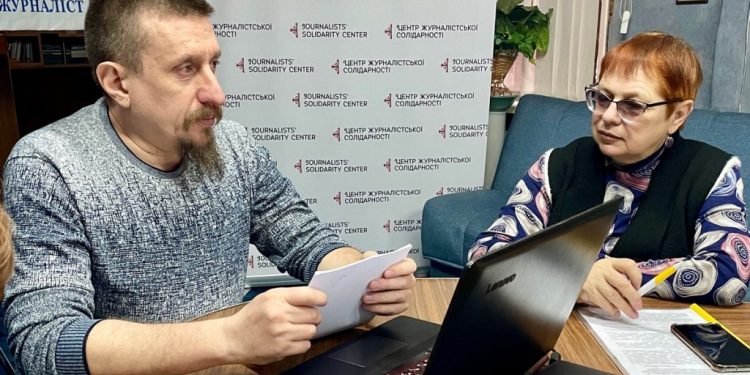The Zaporizhzhia Journalists’ Solidarity Center (JSC) has held a training session called Information Security for Journalists conducted by Oleh Kosmyna, a leading IT specialist.
He talked about the basic principles of cybersecurity and taught journalists methods of combating social engineering. The event was aimed at improving the competence of media workers in the digital sphere and preventing potential risks when working on the Internet.
“Social engineering is a type of cyber attack where hackers use human trust as a tool for various manipulation techniques. Criminals carefully study all the weaknesses and vulnerabilities of a person and use methods of persuasion, emotional pressure, and intimidation to mislead Internet users,” the specialist emphasized.
“To avoid manipulation, you need to “think like a hacker.” This means that you must anticipate all the dangerous situations that can happen on the Internet. Journalists should pay particular attention to digital privacy because, in cyberspace, there is a considerable risk of leakage of important data, theft of information by fraudsters, and espionage,” says Oleh Kosmyna. “In order to prevent such problems, you need to know the basics of computer security.”
The coach emphasized the regular updating of software and antiviruses as hacker techniques are constantly changing and improving. It is also necessary to use two-factor authentication – a method of additional protection of accounts. Oleh advised media people to monitor their passwords. According to many IT specialists, they should be complex and unique: “Be sure to back up important data on multiple media, use cloud storage with data encryption. This is the key to safe use of the Internet.”
In any situation, the specialist advises to keep common sense and remain resistant to stress.
“Misinformation is a big problem of the Internet. The creation of high-quality, reliable content by journalists and compliance with cyber security rules is the greatest countermeasure against the spread of fakes,” the coach emphasizes.
“Thanks to our teacher, I learned more about safety rules when using the Internet,” Svitlana Kostiuk shares her impressions of Ukrainian journalists. “In my opinion, such measures are really necessary for journalists because they directly affect the level of our professionalism.”
Call the Zaporizhzhia JSC at 096 277 5352 (Nataliya Kuzmenko and Valentyna Manzhura, the Zaporizhzhia JSC coordinators). The Center’s address is 152 Sobornyi Avenue.
ABOUT JSC
The Journalists’ Solidarity Centers is an initiative of the NUJU implemented with the support of the International and European Federations of Journalists and UNESCO. The initiative is designated to help media representatives working in Ukraine during the war. The Centers operate in Kyiv, Lviv, Ivano-Frankivsk, Chernivtsi, Zaporizhzhia, and Dnipro and provide journalists with organizational, technical, legal, psychological, and other types of assistance.
ABOUT UNESCO
UNESCO is the United Nations Educational, Scientific, and Cultural Organization. It contributes to peace and security by promoting international cooperation in education, sciences, culture, communication, and information. UNESCO promotes knowledge sharing and the free flow of ideas to accelerate mutual understanding. It is the coordinator of the UN Action Plan on the Safety of Journalists and the Issue of Impunity, which aims to create a free and safe environment for journalists and media workers, thus strengthening peace, democracy, and sustainable development worldwide. UNESCO is working closely with its partner organizations in Ukraine to provide support to journalists on the ground.
The designations employed and the presentation of material throughout this digest do not imply the expression of any opinion whatsoever on the part of UNESCO concerning the legal status of any country, territory, city, or area or its authorities or concerning the delimitation of its frontiers or boundaries.
The authors are responsible for the choice and the presentation of the facts contained in this digest and for the opinions expressed therein, which are not necessarily those of UNESCO and do not commit to the organization.
Yuliya Matkovska, a student of ZNU Department of Journalism
Author’s photo

 THE NATIONAL UNION OF
JOURNALISTS OF UKRAINE
THE NATIONAL UNION OF
JOURNALISTS OF UKRAINE
















Discussion about this post